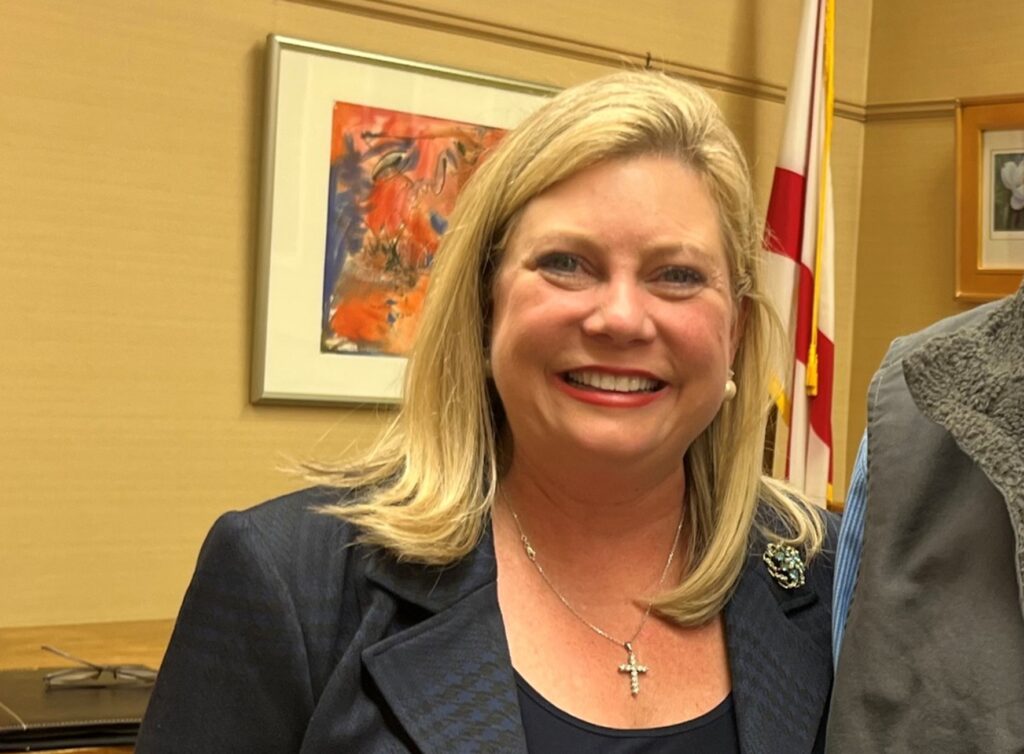Alabama Democratic Party draft bylaws do not include disability caucus

Jemma Stephenson, Alabama Reflector A draft of new bylaws for the Alabama Democratic Party’s governing body restore almost all the diversity caucuses abolished by the party in May, but not one for people with disabilities. The new bylaws, ordered by the Democratic National Committee in October amid criticism of party leadership, must be voted on by Feb. 1. The bylaws, if approved, would restore caucuses for Hispanics, Native Americans, LGBTQ+ individuals, Asian and Pacific Islanders, and youth. Josh Raby, the chair of the party’s disability caucus prior to its abolition at the May 6 meeting, said in a phone interview last week that he was told they were removed from the bylaws because of an unclear definition of what a disability caucus is. “When I received the bylaws, my heart broke, literally, that a party that is supposed to be for the people was excluding people because they couldn’t find a definition of what a disability caucus is,” he said. Raby said that 23 other states have disability caucuses. He said he is sending those bylaws to Alabama Democratic Party chair Randy Kelley, Vice Chair for Minority Affairs Joe Reed, and others. Kelley told the Reflector in a Wednesday morning phone interview that the bylaws were still in draft form. He said he has not heard from membership about other concerns. “I can’t give you the complete update, but we are soliciting input now from the members,” he said. Reed said in a Wednesday morning interview that disability had a range of definitions. “We never had a disability caucus until two years ago when they created it a caucus and couldn’t define it,” he said. When asked why they did not use the definition used by the National Democratic Party, which has a disability caucus, Reed said “we are not required to have every caucus everybody in the world wants.” Reed said that many other states have much shorter bylaws than Alabama. He said that New Jersey’s bylaws are only nine pages. The New Jersey Democratic Party has a disability caucus, according to their website. An ongoing battle The state Democratic Party has been divided for years over representation of individual groups. In 2019, a faction of the party aligned with then-U.S. Sen. Doug Jones won control of the party and implemented DNC-ordered changes to create diversity caucuses representing the full range of groups supporting the state party. A faction of the party aligned with Reed, which included Kelley, objected to the new bylaws, arguing they deprived Black Democrats, who provide the party’s main support, of leadership of the state Democratic Party. Kelley won election as chair in August 2022. At a contentious meeting last May, the State Democratic Executive Committee (SDEC), the governing body of the party, voted to adopt new bylaws that abolished the new caucuses. Following complaints from membership, including Vice Chair Tabitha Isner, the DNC held hearings this fall and ordered the adoption of new bylaws. Raby said people with disabilities deserve a seat at the table. “Republicans should have a disability caucus, independents should have a disability caucus because we are the ones who are always left without a voice,” he said. “We are the ones who get ignored,” he said. Raby said that he believes those in the disability community have not had proper representation. “The people in the disability community want to be seen as being a part of this party and seeing that our voices are being heard. I don’t even think we’re being even respected within the DNC. I can’t even tell you who the chair is of the disability caucus for the DNC, but we got one, you know what I’m saying?” he said. “We got one. But in Alabama, we can’t even say we have one.” Isner said in a phone interview that she was not part of the drafting process and has concerns about the caucuses, but does not know if some of her concerns will be addressed in the final form of the bylaws. She said that not all of the caucuses have vice-chairs, and she wants to make sure that all groups have equal inclusion and access to input to the plan of affirmative action for inclusion in the party. “Certainly making sure that all groups are treated equally is critical to DNC’s policies and bylaws,” she said. The Young Voters Caucus and the Racial Minority Caucus have vice chairs, according to the draft. Kelly said he has been thinking about it and caucuses might not need vice-chairs. Reed says they are satisfied with their bylaws. Both Isner and Raby said the Democratic Party is intended to be for everyone. “It’s the Demo-freaking-cratic party,” Raby said. “We’re supposed to be the party for everyone. Not just some people, not just your friends, not just your buddies, but for everyone, and if you can’t be that, change the mission statement of your party.” Alabama Reflector is part of States Newsroom, a network of news bureaus supported by grants and a coalition of donors as a 501c(3) public charity. Alabama Reflector maintains editorial independence. Follow Alabama Reflector on Facebook and Twitter.
Twinkle Cavanaugh campaigning for fourth term

Alabama Public Service Commission (PSC) President Twinkle Andress Cavanaugh (R) is canvassing the state to convince voters to give her a fourth term in office. President Cavanaugh has made several recent campaign appearances in her quest for re-election. “Thank you for the incredible support we’ve received on the campaign trail! From the state’s northern mountains to the Gulf Coasts’ beaches, I’m on a journey to connect with YOU, my fellow Alabamians. I look forward to meeting each of you!” Cavanaugh said recently on X. Cavanaugh recently spoke to both the Escambia County and Fayette County Republican Party. “Thank you, John Killian, for the invitation to meet with the Fayette County Republican Party and fellow elected Republicans!” Cavanaugh said on X. Prior to these recent appearances, the Cavanaugh campaign visited rural Southwest Alabama. Cavanaugh is a wife, a mother, and a small business owner. Cavanaugh said on her website that she believes a sound energy policy is the foundation for providing maximum opportunity to American workers. Cavanaugh says she has established a model ethics policy, cut government waste to save taxpayers millions of dollars annually, and assured the return of hundreds of millions of dollars to Alabama consumers. Cavanaugh has been a vocal critic of the Biden Administration’s energy policies, which she claims have adversely impacted ordinary American families and businesses with higher energy prices. Twinkle was the first female elected as chairman of the Alabama Republican Party. She is a graduate of Auburn University. She is married to Jeff Cavanaugh, a veterinarian, and they have three children and two grandchildren. They are active members of First Baptist Church in Montgomery and are involved in numerous community initiatives. Cavanaugh was first elected to the PSC in 2010 as a commissioner before being elected PSC President in 2012. Cavanaugh is being challenged for the Republican nomination for PSC President by Dadeville businessman Robert McCollum. McCollum ran previously for the PSC in 2022 – ultimately losing to incumbent Commissioner Chip Beeker in the Republican primary runoff. The Republican primary on March 5 will likely be winner-take-all all as no Democrat qualified for the office. Republicans have a three to zero majority presently on the PSC. To connect with the author of this story or to comment, email brandonmreporter@gmail.com.
Medical marijuana hearings to start Monday

On Monday, the Alabama Medical Cannabis Commission (AMCC) is expected to vote to ratify an agreement with plaintiffs’ attorneys to allow the AMCC to move forward with its timeline to make new cannabis license awards in December. Chey Garrigan is the founder and President of the Alabama Cannabis Industry Association (ACIA). “We are excited about the news that a settlement may have been reached in the ongoing litigation,” Garrigan told Alabama Today. “Our focus has always been on alleviating the suffering of the people of Alabama with conditions that are treatable by medical cannabis.” Attorneys for the Alabama Medical Cannabis Commission (AMCC) have reached a settlement with plaintiffs that would allow the AMCC to begin hearing presentations from applicants starting Monday. Two major sticking points were addressed in the recent closed-door negotiations between all the attorneys. The first issue was the ten-megabyte limit on marijuana application size. The AMCC provided flexibility to help applicants work around the limit – but that information was not distributed, so some applicants submitted applications that were far smaller than what they would have preferred – or did not apply at all because they could not figure out how to downsize their application to ten megabytes without leaving out vital information. In the agreement, there is no limit on the application sizes. The second is the scoring. Independent application evaluators hired by the University of South Alabama graded the applications, assigning them a numerical score and ranking them from first to worst based on the scoring. Those highest-scoring applicants received the awards in the first round of license awards. Failed applicants criticized the accuracy of those scores. The Commissioners, in the agreement, have been ordered not to consider those scores when they consider the applications when they vote on who gets the awards. In exchange for agreeing to those two final points, the lawsuits will be dismissed, and the Commission can move forward with the application presentations. The previous two rounds of applicant awards have all been vacated by the AMCC. Assuming that all goes well with the first part of the meeting, the Commission ratifies the agreement, and no new restraining order is in place, the Commission will then hear presentations from applicants for licenses to cultivate, process, transport, dispense, and operate as the official cannabis laboratory that week. On Monday, the Commission is expected to hear presentations from cultivator and state testing laboratory applicants. On Tuesday, the Commission will hear presentations from the secure transporter and processor applicants. On Wednesday, the Commission will listen to presentations from the dispensary Applicants. According to our current understanding of the process, the Commission will meet on December 1 to make those awards. Next week, the Commission will meet to consider applications from the thirty applicants vying for the integrated facility license. The integrator license allows a business entity to grow, process, transport, and dispense medical cannabis. The Commission can give a maximum of five integrated licenses – thirty applications for vertically integrated licenses were turned in. The Commission will meet on December 12 to award licenses to the integrators. Each applicant will be given about 45 minutes to present to the Commission, and the presentation can include videos. Licenses, if all goes well, could be issued before Christmas. “We wish luck to all of the applicants and look forward to working with the new licensees,” Garrigan said. AMCC Executive Director John McMillan has said that he hopes that Alabamians will be able to purchase Alabama-grown medical cannabis products as early as March. “Our first priority needs to be serving those Alabamians diagnosed with a legitimate medical need,” Garrigan said. To connect with the author of this story or to comment, email brandonmreporter@gmail.com.
Tommy Tuberville joins legislation to hold VA employees accountable

Recently, U.S. Senator Tommy Tuberville (R-Alabama) told Alabama reporters he has joined as a co-sponsor for the Restore VA Accountability Act. “I also Announced my support for new legislation to bring back accountability at the VA,” Tuberville told Alabama press corps reporters in a phone conference. “Under President [Barack] Obama, there was a national scandal. VA facilities in Phoenix and elsewhere had long lines for veterans to get care – then they covered it up and at least 40 veterans even died. It was an absolute disgrace, so President Trump signed a bipartisan bill to fire VA employees who weren’t doing their jobs.” Recently, the Biden Administration settled a class action lawsuit brought by the fired employees and agreed to give them their jobs back. “More than 4,000 VA employees across the country were fired, but now the Biden Administration is ignoring that law,” Sen. Tuberville explained. “They have reached a settlement to give these people their jobs back. They’re even giving them back pay. It is outrageous to the American taxpayer. It’s going to mean worse care for our veterans, so I am supporting legislation to give VA leaders the power they need to hold people accountable. Our veterans deserve the best care we can provide.” Sponsors say that the legislation would restore accountability for the VA while protecting whistleblowers. Specifically, the legislation would: · Ensure VA decisions supported by substantial evidence are upheld on appeal. · Negate the requirement for a performance improvement plan prior to disciplinary action. · Unlock expedited removal, demotion, or suspension authority for use with all categories of VA employees. · Align the disciplinary authority for unsatisfactory VA managers and supervisors with the process currently in place for members of the Senior Executive Service. The passage of the VA Accountability Act of 2017 allowed the VA to cut through cumbersome bureaucratic processes and paperwork to more easily hold bad employees accountable and fire them in an expedited manner. The Biden VA decided it would no longer utilize Section 714 authority as of April 3, 2023. This allowed many of the 4,000 VA workers dismissed from their duties with cause to return to their positions. In March, VA Secretary Denis McDonough testified before the House Veterans Affairs Committee that “Section 714 wasn’t really helping us necessarily manage our workforce as much as it was getting us in front of federal judges and in front of administrative bodies.” McDonough stated, “In all cases, we do think we have what we need to manage our authorities outside” the 2017 law. Tommy Tuberville was elected to the U.S. Senate in 2020. To connect with the author of this story or to comment, email brandonmreporter@gmail.com.
Problems around the world remind us of Thanksgiving blessings right here in Alabama

The American tradition of Thanksgiving is special for a lot of reasons. The opportunity to celebrate our blessings with our family and friends may come to mind first. Yet, it is also a day that we are thankful for our Nation and the freedoms and liberties we enjoy as United States citizens. With all the challenges we face in the Nation and the world, it would be easy to be cynical about the holiday this year. However, reflecting back on the origins of the original Thanksgiving enjoyed by the Pilgrims and Native Americans, it should remind us how difficult they had it back in the fall of 1621. When we look at the current headlines, we may rightly question the future direction of our country. Crippling inflation, the crisis at the border, out-of-control violent crime, and the threats to national security make it easy to want to look for other reasons to be thankful. Add to that the wars being fought in Europe and the Middle East; it is enough to really question what to show gratitude for this year. Sometimes, it takes a child to help us really appreciate what we should be thankful for in our lives. My young son is studying Alabama history for the first time. With a freshly drawn map of our state, he proudly rolled off all of the attributes that make our state such a good place to call home. From the Appalachian mountains in the north to the beaches on the Gulf to Mexico, Alabama has beautiful topography and geography, he reminded me. He recounted to me, from pine trees to iron ore, all of the abundant natural resources our state has to share with our country and the world. However, what excited him the most was talking about all of the famous people who have hailed from Alabama. This made his point even more clear about our state: it is the people who live here that make it so special. We live in a state where it is true that neighbors really do take care of each other, and its citizens are proud to be American. Thus, as my son reminded me when we look around at the place we call home, Alabama and its citizens really do shine as a state. When we thank God at our meal table for the blessings this week for the country we live in, let us also say grace for having the privilege to live in our small part of the world, sweet home, Alabama. Paul DeMarco is a former member of the Alabama House of Representatives and can be found on X, formerly Twitter, at @Paul_DeMarco.
Rapists, sex offenders among those illegally entering U.S.

By Bethany Blankley | The Center Square contributor Rapists and sex offenders are among the most violent people illegally entering the U.S., according to U.S. Customs and Border Protection. They illegally enter to avoid punishment in their home country or illegally enter the U.S., commit violent offenses, and then attempt to flee back to their home country, agents say. In one recent case, ICE’s Enforcement and Removal Operations (ICE-ERO)-Boston agents arrested a Brazilian man who illegally entered the U.S. and was wanted in Brazil for raping a 5-year-old. The 37-year-old Brazilian man was arrested Nov. 14 on Martha’s Vineyard near his residence in West Tisbury, Massachusetts. Prior to illegally entering the U.S. during a previous administration, the Brazilian national was convicted on multiple counts for raping a child. After his convictions and before he was sentenced to 14 years in prison, he fled Brazil and illegally entered the U.S. He “unlawfully entered the United States on an unknown date at an unknown location without being inspected or admitted by an immigration official,” ICE said. He represents one of millions of gotaways – foreign nationals who illegally enter the U.S. between ports of entry to intentionally evade capture by law enforcement. Law enforcement officials have no idea how many, who or where they are. They are among at least 1.7 million since January 2021, The Center Square previously reported. In May 2019, after failing to appear for his sentencing, the 2nd Criminal Court of Sorriso in Sorriso, Mato Grosso, Brazil, issued a warrant for his arrest. It would take another four and a half years – until Sept. 28, 2023 – for ICE to learn of his whereabouts in the U.S. And after ICE ERO-Boston agents became aware of his presence on Martha’s Vineyard, it would take another six weeks to apprehend him. He was apprehended during a vehicle stop and served with a notice to appear before a Department of Justice immigration judge. He remains in ERO custody pending his removal proceedings. “This undocumented Brazilian national represented a significant threat to the inhabitants of Martha’s Vineyard,” ERO Boston Field Office Director Todd Lyons said. “He sexually assaulted a five-year-old child in his homeland and then ran from authorities when held accountable for his actions. ERO Boston will not allow such predators to threaten our residents. We will continue to apprehend and remove anyone who attempts to use our New England community as a refuge from justice.” In another recent case, border agents arrested two El Salvadorans wanted for rape in Maryland who were attempting to flee the U.S. by heading back to El Salvador. One was in the country illegally and had previous removal orders. The other had lawful permanent residence status. Both were processed for removal. Federal agents apprehended the suspected rapists and fugitives at Washington Dulles International Airport in late October. One 53-year-old Salvadoran man who was illegally in the U.S. was first arrested in Montgomery County, Maryland, with a warrant for felony second-degree rape and sexual abuse of a minor. He was previously ordered to be removed from the U.S. by an immigration judge in 2006. The second 53-year-old Salvadoran man who was arrested had a warrant out for his arrest in Prince George’s County, Maryland, for felony second-degree rape. Critics argue that their plan to flee to El Salvador indicates that any claims they made to justify staying in the U.S. were likely invalid because after they were caught committing a crime, they tried to go back to El Salvador. Their arrests came after ICE-ERO agents arrested two violent criminals wanted in El Salvador and Brazil: an MS-13 gang member on El Salvador’s Top 100 list and a Brazilian military officer involved in a 2015 massacre. They were apprehended in Alabama and New Hampshire, respectively. In fiscal year 2022, ICE ERO agents arrested 46,396 illegal foreign nationals with criminal histories, including 198,498 associated charges and convictions. The charges and convictions include 21,531 assault offenses; 8,164 sex and sexual assault offenses; 5,554 weapons offenses; 1,501 homicide-related offenses; and 1,114 kidnapping offenses. In fiscal year 2022, ICE ERO agents also conducted 72,177 removals to over 150 countries. Republished with the permission of The Center Square.


